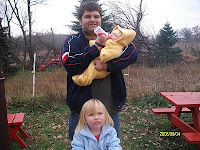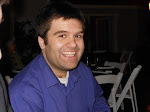So it looks like Brett
Favre isn't coming to play for the Vikings.
Zippity-gosh-darn-do. I'm just glad the story is over. Although, let's be realistic: it's probably not over. It's never over with
Favre. There will be rumors that he just wants to skip training camp and will make a comeback in time for the last two preseason games. There will be rumors that he just wanted to skip the preseason and will sign in time for the regular season opener. There will be rumors that he didn't want to wear down over the course of a 16-game season again and will join a championship contender in Week 8.
If there's one thing we've learned about
Favre it's that he doesn't know when to quit and even when he thinks he knows when to quit, he doesn't know when to quit thinking about whether he really wants to quit. And the fact that this is now a non-story won't keep the national sports media from trying to make it a story. Hell, it's been a non-story for months and yet desperate sports reporters from across the country have tried to fill space with breathless "updates" nearly every day. "
Oooh, the Vikings' trainer was in Mississippi today talking to
Favre.
Oooh, two Vikings sent text messages to
Favre today.
Oooh,
Favre looked great throwing a
buttonhook to some high school kid today." Honestly guys, I know the summer is slow, but are you that starved for content?
BTW, those were the real winners in the
Favre Saga — the players from Oak Grove High in Mississippi who got tons of national TV exposure because
Favre was playing catch with them. Except for the one kid who couldn't get his hands up fast enough and ended up taking a
Favre missile in the face. Having that clip play over and over again on ESPN is not going to help you get a date for Homecoming.
The biggest loser in the saga? I honestly don't think it was the
Vikes. As much as
Favre has been romanticized, it seems often forgotten that he is the
NFL's all-time interceptions leader. The Vikings have a solid defense and a great running game, what they need is a caretaker quarterback who can keep the defense honest without throwing the ball to the other team. I'm not sure if T-Jack or Sage
Rosenfels can be that quarterback, but I'm pretty sure
Favre can't be. His "I-can-fire-any-pass-into-triple-coverage" ego won't allow it.
Favre wasn't the biggest loser, either, though. Sure, he missed out on some money, but he already has plenty. He missed out on another championship shot, but he already has a Super Bowl ring and there's no guarantee he would have gotten another. Meanwhile, he avoided playing with a mediocre receiving corps and an offensive line built for run-blocking, not pass-blocking (if you've ever seen Bryant
McKinnie trying to back-pedal, you know what I'm talking about).
I'd say that the people with the most egg on their faces are the sports reporters who for months have acted like this was basically a done deal. Since I returned to Minnesota the Star Tribune has been running a daily
Favre-Meter and for all of July the meter has been stuck somewhere between "Almost a sure thing," and "Get your purple No. 4 jersey." Now it turns out all the "careful research" and "well-informed" sources behind that reporting were wrong. Dead wrong. 180 degrees wrong. Once again, by rushing to judgement and substituting speculation in the absence of actual story developments, the media looks foolish. As if laying off hundreds of copy editors hadn't already made it look foolish enough (BTW, Star Tribune, Ron
Gardenhire is the Twins' "manager" not the Twins' "manger." And spell-check isn't going to catch that, so you might actually have to do a thing called "editing").
Yep, the
Favre Saga made the media look pretty stupid. Then again, maybe we're the stupid ones for still believing what we read in the newspaper/see on TV/glance at in the
blogosphere. You could make a case that the biggest losers were the
Vikes fans who took the
Strib's advice, jumped the gun and bought those purple
Favre jerseys. They're out $50 or so.









